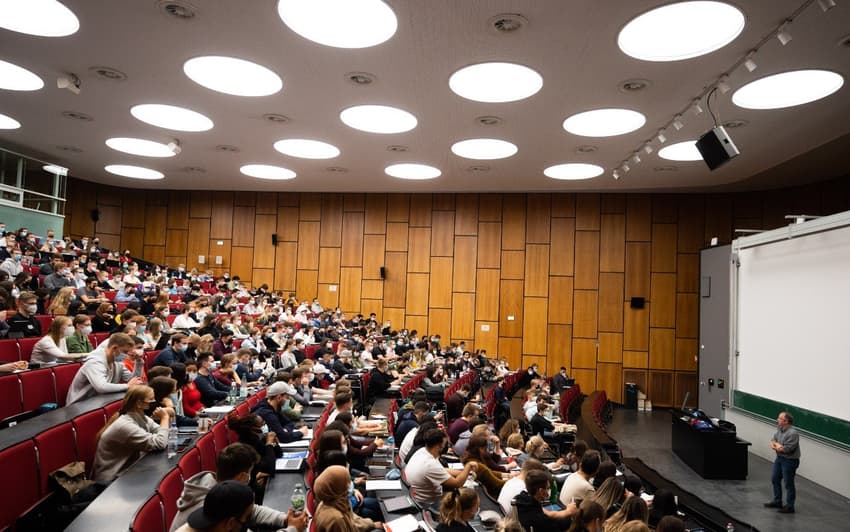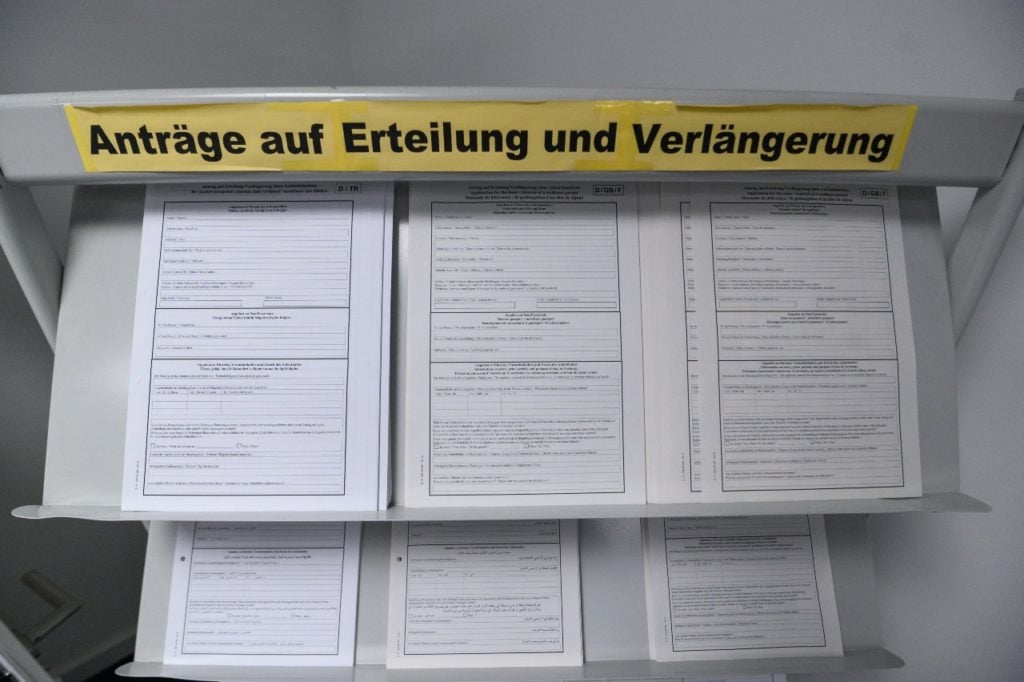How to stay in Germany after graduating from a German university

If you’ve finished up your studies in Germany – either at a university or accredited technical institute – your path to staying is a little simpler than it is for most people, even other skilled workers.
With the German economy currently needing about 400,000 new skilled workers a year just to fill the current gaps in the labour market, foreign students graduating from German universities are in particularly high demand.
Having already spent years in the country, with experience in both the German language and how the country works bureaucratically – as well as training in Germany itself, the country is keen to keep recent graduate students here.
If you’re about to graduate from a German educational institution, there’s a few key ways staying here to work is just a little bit simpler – provided you get the right paperwork in order after graduation.
READ ALSO: INTERVIEW: ‘Germany needs to become more attractive for immigrants’
A generous residence grace period to find a job
One key advantage recent non-EU graduates have – even over other skilled jobseekers – is the amount of time they have to find a job before they have to leave the country.
Rather than leave the country as soon as you graduate, you can simply convert your student residence permit into a special type of jobseeker’s visa.
What’s more, your official date isn’t typically the day of your graduation ceremony, but rather the official end of the semester. That might end up being months after you actually hand in your last thesis, paper, or final exam. So you have time to do the necessary bureaucracy after you finish your studies (provided you're quick!).

Visa application forms at Hamburg Foreigner's Office. Recent graduates of German universities are entitled to a special type of jobseeker's visa, and a shorter wait to permanent residence if they find a job. Photo: picture alliance/dpa | Jonas Walzberg
Furthermore, the jobseeker’s visa a recent graduate in Germany gets has several advantages over a standard jobseeker’s visa.
Firstly, recent non-EU graduates may stay in Germany for up to 18 months to look for a job that matches their qualifications. Those with a regular jobseeker’s visa are only given six months by comparison.
Recent graduates can also work without restrictions – for example in temporary or part-time jobs – while they look for the full-time gig that matches their qualifications. People on a regular jobseeker’s visa cannot do this.
Once you have a job offer, or have started a business that matches your qualifications, you can convert your jobseeker’s visa into the relevant residence permit. People starting up a business or working as freelancers may have to submit a business plan to have their permit approved, just as successful job applicants submit their job offers.
READ ALSO: Germany or Austria: Where is it easier to get an EU Blue Card?
What visa do I convert to after I get a job or start a business?
Once you have a job offer, you can convert from your graduate jobseeker’s visa to a work visa for qualified professionals or researchers, an EU Blue Card, a start-up founder visa, or a freelancer visa.
A work visa or EU Blue Card can be made valid for up to four years, and you can apply for a settlement permit – or permanent residence in Germany – after only two years of being employed instead of the regular four years it normally takes.
Once you have a permanent residence permit, you have unrestricted access to the German labour market, with your visa not being dependent on the length of your employment contract. You’re also no longer restricted to the field of your academic qualification.
An EU Blue Card will typically require the applicant to have a job offer with a salary of at least €56,400 per year, unless they’re working as a doctor, engineer, IT specialist, mathematician, or natural scientist. In this case, they’ll need a minimum annual. salary of €43,992.
Start-up founder visas can be granted for up to three years and freelance visas for up to two years. Both can be renewed and ultimately converted into permanent residence permits.
READ ALSO: What foreign students should know about applying for German citizenship
Ultimately, recent graduates have both a longer and easier time of finding a job in Germany following graduation. Once they have a job, their path to permanent residence is also generally faster – leaving them with quite a few significant advantages over regular jobseekers.
Comments
See Also
With the German economy currently needing about 400,000 new skilled workers a year just to fill the current gaps in the labour market, foreign students graduating from German universities are in particularly high demand.
Having already spent years in the country, with experience in both the German language and how the country works bureaucratically – as well as training in Germany itself, the country is keen to keep recent graduate students here.
If you’re about to graduate from a German educational institution, there’s a few key ways staying here to work is just a little bit simpler – provided you get the right paperwork in order after graduation.
READ ALSO: INTERVIEW: ‘Germany needs to become more attractive for immigrants’
A generous residence grace period to find a job
One key advantage recent non-EU graduates have – even over other skilled jobseekers – is the amount of time they have to find a job before they have to leave the country.
Rather than leave the country as soon as you graduate, you can simply convert your student residence permit into a special type of jobseeker’s visa.
What’s more, your official date isn’t typically the day of your graduation ceremony, but rather the official end of the semester. That might end up being months after you actually hand in your last thesis, paper, or final exam. So you have time to do the necessary bureaucracy after you finish your studies (provided you're quick!).

Furthermore, the jobseeker’s visa a recent graduate in Germany gets has several advantages over a standard jobseeker’s visa.
Firstly, recent non-EU graduates may stay in Germany for up to 18 months to look for a job that matches their qualifications. Those with a regular jobseeker’s visa are only given six months by comparison.
Recent graduates can also work without restrictions – for example in temporary or part-time jobs – while they look for the full-time gig that matches their qualifications. People on a regular jobseeker’s visa cannot do this.
Once you have a job offer, or have started a business that matches your qualifications, you can convert your jobseeker’s visa into the relevant residence permit. People starting up a business or working as freelancers may have to submit a business plan to have their permit approved, just as successful job applicants submit their job offers.
READ ALSO: Germany or Austria: Where is it easier to get an EU Blue Card?
What visa do I convert to after I get a job or start a business?
Once you have a job offer, you can convert from your graduate jobseeker’s visa to a work visa for qualified professionals or researchers, an EU Blue Card, a start-up founder visa, or a freelancer visa.
A work visa or EU Blue Card can be made valid for up to four years, and you can apply for a settlement permit – or permanent residence in Germany – after only two years of being employed instead of the regular four years it normally takes.
Once you have a permanent residence permit, you have unrestricted access to the German labour market, with your visa not being dependent on the length of your employment contract. You’re also no longer restricted to the field of your academic qualification.
An EU Blue Card will typically require the applicant to have a job offer with a salary of at least €56,400 per year, unless they’re working as a doctor, engineer, IT specialist, mathematician, or natural scientist. In this case, they’ll need a minimum annual. salary of €43,992.
Start-up founder visas can be granted for up to three years and freelance visas for up to two years. Both can be renewed and ultimately converted into permanent residence permits.
READ ALSO: What foreign students should know about applying for German citizenship
Ultimately, recent graduates have both a longer and easier time of finding a job in Germany following graduation. Once they have a job, their path to permanent residence is also generally faster – leaving them with quite a few significant advantages over regular jobseekers.
Join the conversation in our comments section below. Share your own views and experience and if you have a question or suggestion for our journalists then email us at [email protected].
Please keep comments civil, constructive and on topic – and make sure to read our terms of use before getting involved.
Please log in here to leave a comment.